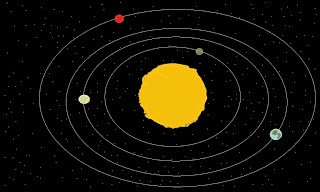Another,
larger frontier opened up during the Cold War, when the U.S. and the Soviet Union
both began to look skyward to one-up each other in attempts to be the first
nation to ________ in space. Once again, Americans had a new frontier to reach
towards. Space, being infinite, provided endless possibilities for exploration
and discovery, not even 70 years after the first manned airplane flight on
Earth. But after beating the Soviets to the moon, the U.S. has lessened its
emphasis on space exploration and in the process its people have largely lost
interest in advancing frontiers up above.
This
past Monday, while much of the United States was sound asleep, a NASA rover named
Curiosity hurtled through the Martian atmosphere and landed safely on dusty,
rust-colored soil inside a crater millions of miles from Earth. Hours earlier, while
Curiosity began its final descent onto a planet named for the Roman god of war,
the nation was left picking up the pieces of yet another mass shooting—this
time at a Sikh temple outside Milwaukee. Few 24-hour periods could more aptly display
the American tendencies for both pushing boundaries and for self-destruction.
The tragic shooting was also a stark reminder that while investing in a space
program may be an achievement worthy of praise, we have many more pressing issues
to deal with domestically. Some have questioned the prudence of spending $2.6
billion on a trip to a red planet to look for rocks when back home we are faced
with a shaky economy, high unemployment, and an endless list of grave problems,
ranging from gun violence to crumbling infrastructure to homelessness to global
warming. Couldn’t such a gargantuan sum of money have been better spent here on
Earth? Shouldn’t we take care of business at home before sending our precious
resources into outer space?
The
budget of any governmental unit can be viewed as a reflection of the priorities
of its people. We invest in roads
because we, as a people, value ease of travel. We fund schools because we believe
educating young people is a critical tool for improving society. We fund
national parks because we want to protect our natural resources for the future.
The reasons for spending billions on a space program are somewhat more ambiguous—largely
because they don’t materially affect the average person—yet they are still
quite substantial. We fund missions to space because we believe it is in the
national interest to advance the field of science, to promote human
achievement, and to seek answers to the great mysteries of the universe. While
we have often sought to expand our presence outside our own atmosphere due to
nationalistic urges, to one-up a rival, excelling in space doesn’t need to be
viewed as an agonistic pursuit: we merely must continue to explore uncharted
territory because we are Americans and that is what we do. To echo the words of
President Kennedy, we must continue to press on in space not because it is easy
to do so, but because it is hard.
While
much has changed about the world since humans first reached the moon in 1969,
what has not changed is how monumental a feat it was for our species, still
easily ranking near the top of a short list of human accomplishments. It was
indeed a giant leap for all of humanity, not just the United States. Just as
Olympians at the ongoing Games in London have shown, there lies a beauty in
pushing to the limit what we humans can do. To use the mind and body to
accomplish what people once believed impossible. It is often a herculean task
to do these things; they are frequently criticized, usually expensive, and
always time-consuming. But we must keep our eyes on the astounding value that
the end results can give us. While there is no way of knowing what we will find
or not find on Mars—elements that make up the building blocks of life or nothing
but lifeless, red dust—the potential for what we could learn greatly outweighs
the costs. Discovering concrete evidence that life has existed elsewhere in the
solar system would be a watershed moment in human understanding about our place
in the universe, shedding greater light on who we really are.
This is
not to say that funding the space program should be the first or only priority
of the United States government. Planned cuts to the space program in the
coming years may indeed be necessary, but we should never stop seeking to strike
a balance between meeting America’s needs at home—creating meaningful opportunities
for all of our people and living up to the lofty ideals espoused in our
constitution—while also giving people something to look up at and feel a sense
of pride— to not just wonder if little green men inhabit the upper crust of
some faraway red-tinted sphere, but to be able to say that humans are capable
of reaching that place and actually finding out what is there. We need to
continue to push ourselves to these heights, reaching Mars through technology
and one day, sending ourselves there (and points beyond) to provide for future
generations an extension of the dream that anything is possible.
Though
Turner was wrong that American identity would be permanently harmed when the
Western Frontier was pronounced closed, he was likely correct in saying that
America won’t be what it once was if we take our focus away from the ‘frontier’—regardless
of its form or location in the universe. If we cease to innovate, to reach
beyond what has been done before, to search for answers, to push the frontier further,
we will cease to be who we are. No matter the economy, no matter the current
political climate, no matter how difficult things may seem, we must never lose
sight of that.

No comments:
Post a Comment